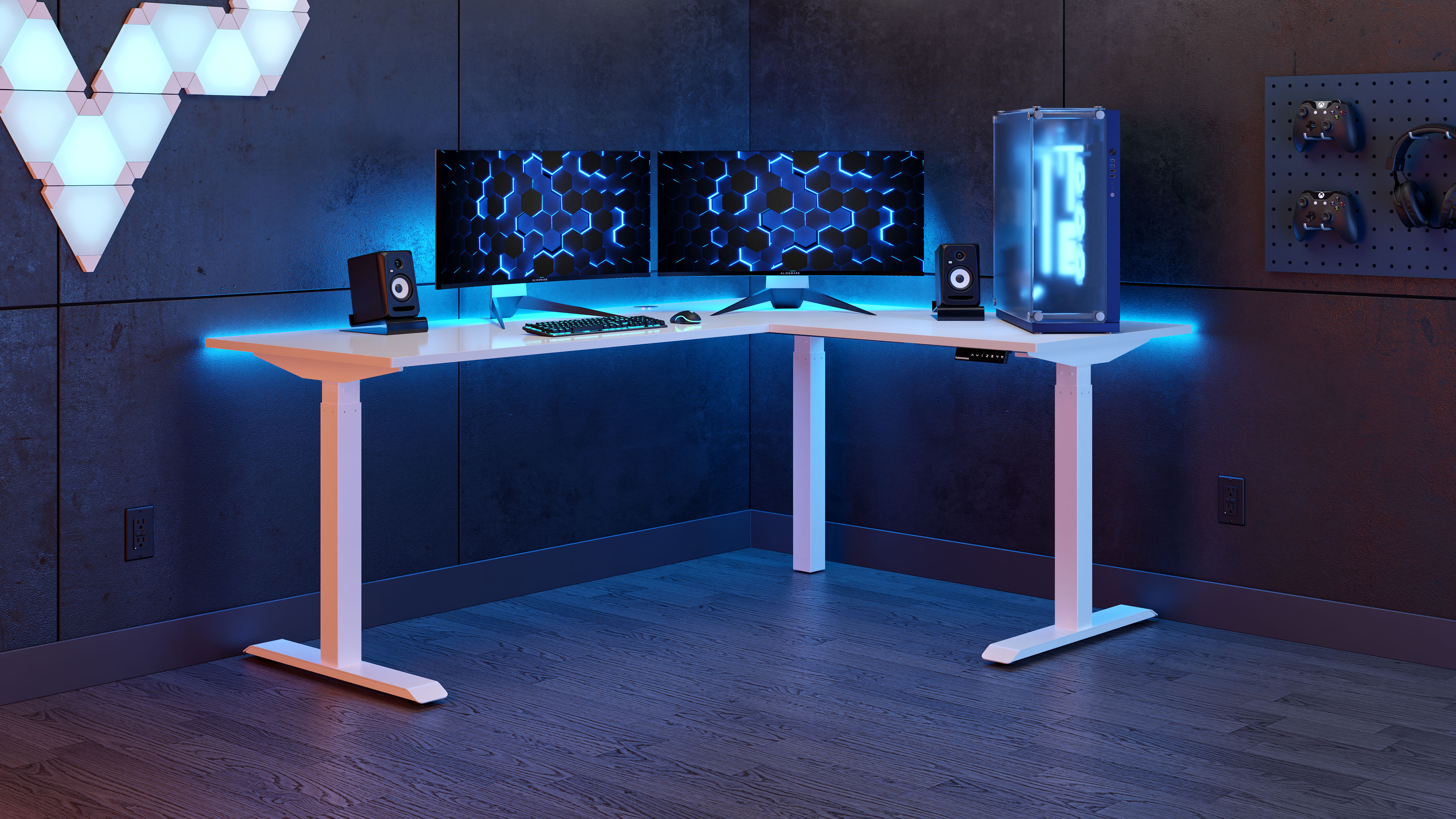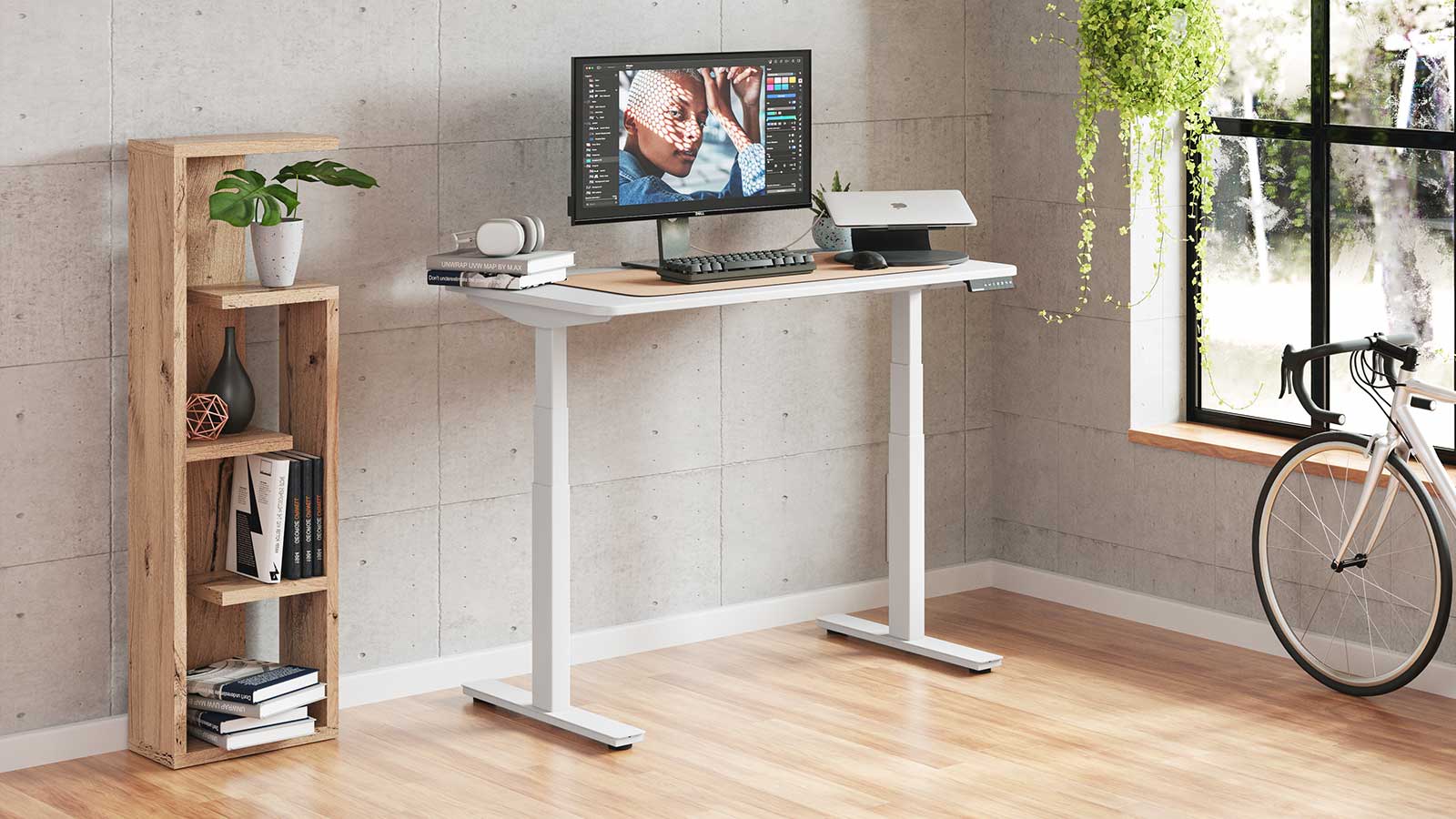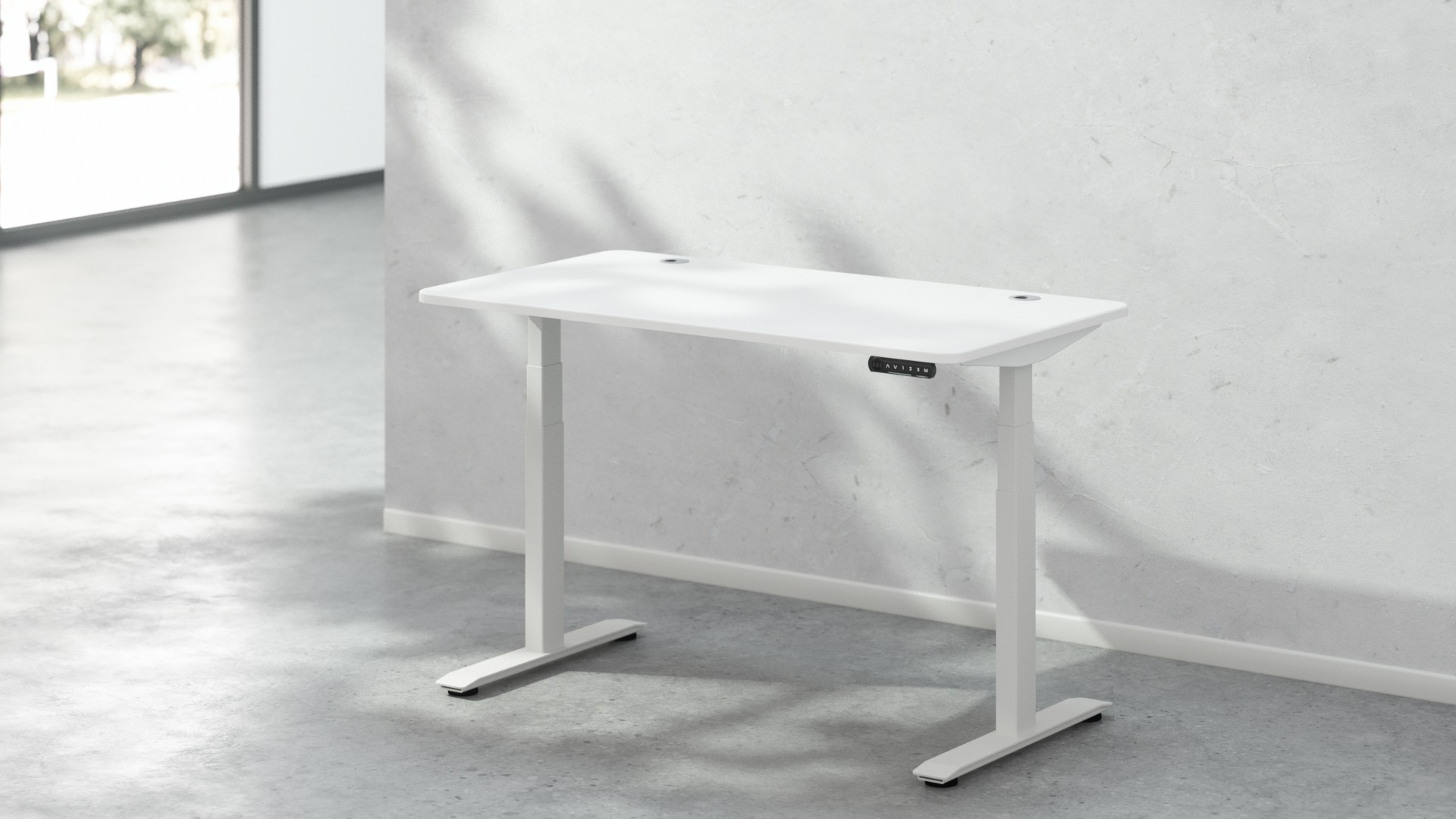
Fight Prolonged Standing at Work: 10 Essential Tips & Product Reviews
Table of Contents
- The Potential Health Risks Associated with Prolonged Standing at Work
- Why Should You Opt for a Balance?
- 10 Tips to Combat Prolonged Standing
- The Top Standing Desks to Tackle the Challenges of Standing Too Long
- Additional Useful Accessories for Standing Desks
- Benefits of a Standing Desk and Sit-stand Routine
- Final Thoughts
In the modern workplace, prolonged standing has become a significant concern. Being on your feet all day might seem routine, especially in specific jobs, but it's not as benign as it appears. Standing for long periods of time can lead to various health issues, ranging from joint pain to circulatory problems.
The issue gets more challenging as many of us may not even realize we're standing for a long time until our bodies send distress signals. However, worry not! This article provides you with practical and easy-to-implement tips to combat the ill effects of standing for extended periods at work.
Therefore, whether you're a retail employee, a teacher, or a standing desk enthusiast, these strategies can help you have a healthier and more comfortable workday. Stay with us as we navigate the path to a better understanding of this issue and discover solutions to mitigate it.
The Potential Health Risks Associated with Prolonged Standing at Work
Standing at work all day is not as harmless as it may seem. Though we often hear about the risks of sitting too much, standing for hours has its own set of drawbacks. In fact, the human body is not designed for extensive periods of immobility, whether it's sitting or standing.
Discomfort in the Body
One of the main issues related to standing excessively at work is discomfort in the feet, legs, and lower back. Over time, this discomfort can evolve into severe musculoskeletal disorders.
Other risks associated with standing for extended periods include lower limb problems, varicose veins, and joint compression. Additionally, standing all day may lead to circulatory problems as it strains the heart, causing an increased risk of cardiovascular disorders.
Feeling Fatigued
Prolonged standing also contributes to fatigue, which can result in reduced productivity and focus. Moreover, standing still for long durations might lead to decreased muscle flexibility and joint mobility, leading to conditions such as tendonitis.
Why Should You Opt for a Balance?
Interestingly, people may think, is it healthy to stand all day? Well, just as with any activity, moderation is key. A balance between sitting, standing, and moving is ideal for maintaining good health.
It's crucial to understand that our bodies are made for movement. Hence, changing between different postures and adding exercise to your workday can help mitigate these risks.
In essence, standing for long hours without adequate breaks or variation in posture can lead to numerous health issues. Furthermore, it's not about completely eliminating standing from your workday but about finding the right balance and ensuring that you're correctly standing when you do.
10 Tips to Combat Prolonged Standing
As we navigate the challenges of prolonged standing at work, we must arm ourselves with effective strategies. Here are 10 tips to mitigate the physical strain of long standing and enhance your overall comfort and productivity throughout the workday.
Tip 1. Implement a Sit-stand Schedule
Adopting a sit-stand schedule can significantly help those who experience long standing periods at work. This technique is about evenly splitting your time between sitting and standing.
Experts suggest standing for 20 minutes, sitting for 20, and then moving around for the next 20. Naturally, this balance reduces the strain on your body and increases overall productivity.
Tip 2. Wear the Right Footwear
Choosing the right shoes for standing too long at work can significantly reduce discomfort and potential health risks. Shoes should be comfortable, provide good arch support, and have cushioning to absorb impact. You may also want to consider anti-fatigue matting for extra foot comfort.
Tip 3. Maintain Proper Posture
Maintaining proper posture is essential when standing for long periods of time. Keep your shoulders relaxed, back straight, and ensure your weight is evenly distributed between both feet. This alignment will minimize strain on your joints and muscles.
Tip 4. Regular Movement and Stretching
Frequent movement and stretching are vital to reducing the harmful effects of prolonged standing. Simple activities such as walking, calf raises, or even marching in place can stimulate blood flow and prevent stiffness. Taking short, regular breaks to move and stretch will significantly help your body and mind.
Tip 5. Use a Standing Mat
A standing mat for a desk is a beneficial tool for those who are on their feet all day. These mats can encourage subtle movements of the feet and legs, improving circulation and reducing fatigue.
Tip 6. Adjust Workstation Height
Your workstation's height can significantly affect how you feel after a day of standing. Ensure your workstation is at a comfortable height where you can keep a straight posture and your arms relaxed.
An ideal setup is where the top of your screen is at or slightly below eye level. It would be best to position the keyboard and mouse better so your elbows rest at a comfortable, near-90-degree angle.
With a correctly adjusted height, you can prevent excessive strain on your neck, shoulders, and wrists, leading to increased comfort and productivity during your workday.
Tip 7. Add a Strength and Flexibility Training
Incorporating strength and flexibility exercises in your daily routine can also help combat the effects of standing for long periods. Exercises that target your core, legs, and back will help build strength, improve posture, and alleviate discomfort.
Tip 8. Stay Hydrated
Hydration is vital to maintaining overall body function and well-being. When standing for long periods, drinking plenty of water is important to stay hydrated and keep your muscles functioning optimally. Furthermore, adequate hydration helps maintain a healthy circulatory system, which is essential for standing tasks.
Water also helps in the prevention of fatigue, assisting you in maintaining high energy levels and focus throughout your workday. Moreover, it may help ease tension and prevent cramps in the muscles, enhancing your comfort while you stand.
Tip 9. Use Footrests for More Comfort
Often, we underestimate the value of footrests - they're not just for when we're sitting. A footrest while standing is a simple yet effective way to lessen discomfort. You change your body's center of gravity by elevating one foot intermittently.
This slight shift can significantly reduce the strain on your lower back and legs. Additionally, alternating your feet on a footrest improves blood circulation, especially when you're standing for long periods.
Tip 10. Seek Ergonomic Assessments
Lastly, consider getting an ergonomic assessment for your workplace. These assessments provide personalized recommendations to adjust your work environment for optimal health and productivity, particularly when standing for prolonged periods.
The Top Standing Desks to Tackle the Challenges of Standing Too Long
As the benefits of standing desks gain recognition, the market overflows with numerous options. If you've been standing at work all day and feel the toll, you might find relaxation in one of these top-rated desks.
We've combed through some of the best standing desks, all suited to fit your workspace and needs, helping you find the perfect balance between sitting and standing.
1. Autonomous Desk 2 (Standard)
First on our list is the Autonomous Desk 2 (Standard), an essential standing desk designed for those seeking an optimal balance between performance and price. What stands out about this model is its versatility, thanks to its adjustable height and four programmable keypad settings.
The steel frame and dual motor exude strength, easily lifting up to 250 lbs. Additionally, it offers diverse desktop size options, making it an excellent choice for both compact and spacious workspaces. This unit thrives in simplicity while delivering functionality, making it a worthy addition to your home standing desk options.
.jpg)
Autonomous Desk 2 (Standard)
Pros | Cons |
|---|---|
| It lifts up to 250 lbs | No in-built cable management |
| Adjustable height | Possibility for motor noise at max load |
| Sturdy steel frame | Quite heavy |
| Various desktop sizes | Limited color choices |
2. Autonomous Desk 2 L-Shaped
If you're looking for ample workspace without compromising power, the Autonomous Desk 2 L-Shaped is perfect for you. It's engineered with a triple motor and modular segments and can adapt to corners seamlessly.
The programmable keypad allows for effortless adjustment, adjusting your preferred sitting or standing positions. This unit's design and construction enhance its durability and functionality. Moreover, its whisper-quiet motor comfortably lifts 400 lbs., making it an excellent choice for a robust office setup.

Autonomous Desk 2 L-Shaped
Pros | Cons |
|---|---|
| Ample space | Larger footprint |
| Quiet triple motor | It might be overkill for small setups |
| Robust steel frame | Heavy to move |
| Four programmable settings |
3. Autonomous Desk 2
Now, for those who want more range and power, the Autonomous Desk 2 takes standing desks to a whole new level. Its height adjustability, improved dual motor, and load capacity of 310 lbs. make it a fantastic choice for professionals with heavy-duty requirements.
Furthermore, the quiet operation at 40 dB makes it an attractive option for those seeking a calm work environment. This smart desk is a result of years of innovation, offering the highest level of performance and versatility.

Autonomous Desk 2
Pros | Cons |
|---|---|
| High lifting capacity | It might be excessive for basic needs |
| Wide height range | Large size requires space |
| Super quiet operation | It needs a power supply nearby |
| Seven-year warranty |
4. Autonomous Desk
Last but not least, the Autonomous Desk merges technology with design to revolutionize your workspace experience. With the convenience of app-controlled fine-tuned adjustments, scheduling sitting and standing sessions becomes effortless.
Its distinctive anti-collision feature provides peace of mind, ensuring safety alongside functionality. The dual motor allows for a smooth transition between heights, supporting up to 350 lbs. Also, with the Autonomous Desk, you can bring home a standing desk and an intelligent office accessory that empowers you to work your way.

Autonomous Desk
Pros | Cons |
|---|---|
| Advanced app controls | It requires a tech setup |
| Anti-collision feature | Power supply needed |
| Robust weight capacity | It might be complex for some |
| Seven-year warranty |
Additional Useful Accessories for Standing Desks
Standing desks can transform your work routine, but the right accessories can truly maximize their benefits.
- Standing mat: If you've been standing for hours, a standing mat for your desk could be a game-changer. It is designed to cushion your feet and helps reduce the strain on your legs and back, making your stand-up sessions more comfortable.
- Flow board: Speaking of comfort, introducing a flow board to your setup can do wonders. These boards promote micro-movements, helping you maintain balance and engage your muscles while standing. They offer physical benefits and enhance your cognitive function by stimulating the mind-body connection.
- Monitor arms: In the realm of standing desk accessories, monitor arms also hold great importance. Generally, they allow for effortless screen adjustments, maintaining an optimal viewing angle and reducing the risk of neck strain.
- Cable management: Also, let's not forget about cable management solutions. Keep your workspace clutter-free and your mind clear, enhancing productivity.
Remember, a standing desk is just the beginning. You can craft a healthier, more productive workspace with the right accessories.
Benefits of a Standing Desk and Sit-stand Routine
Adding a sit-stand routine into your workday can bring about many health advantages. If you're wondering about the benefits of a standing desk, let's dive in and explore them:
- Boost in energy: Standing promotes blood flow, sparking energy and alertness.
- Calorie burn: The difference in calories burned standing vs. sitting is noticeable. Hence, standing burns more!
- Posture improvement: Standing encourages a straight spine, reducing back and neck pain.
- Productivity increase: This active posture can enhance focus and productivity.
Remember, the key is balance. Changing between sitting and standing can help avoid fatigue from standing too long. This way, you get the best of both worlds.
Final Thoughts
Choosing the right standing desk can boost your productivity and improve your health. As we've seen, the Autonomous Desk series offers choices for everyone, whether you prefer the basics or more advanced tech features.
Additionally, choosing the right office accessories can improve your work life significantly. Accessories such as a flow board can amp up your productivity while offering health benefits as well.
Keep in mind that the journey to better work habits starts with standing up. There's no better way to start than with a well-chosen standing desk. Make the switch and experience the difference today. The ideal standing desk is just a decision away. Don't let your health and productivity go to waste.
Spread the word
.svg)


.webp)
.webp)




